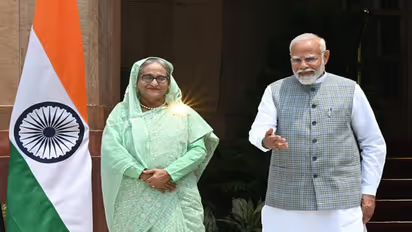Sheikh Hasina extradition: Bangladesh to send follow-up note verbale to India; experts slam political gimmick

Synopsis
Days after Bangladesh issued a note verbale to India seeking the extradition of its former Prime Minister Sheikh Hasina to face genocide charges in Dhaka, the country announced plans to send a follow-up note verbale.
New Delhi: Days after Bangladesh issued a note verbale to India seeking the extradition of its former Prime Minister Sheikh Hasina to face genocide charges in Dhaka, the country announced plans to send a follow-up note verbale.
The adviser to the Bangladesh’s foreign ministry told reporters on Wednesday that, “Nothing has been received from New Delhi on the first note verbale issued on Monday and will send a reminder soon."
Sheikh Hasina, who fled Bangladesh on August 5, has been residing in India following widespread protests in her home country that led to her resignation and escape.
Experts believe that these sending note verbale is a political gimmick and nothing more than that. The interim government has failed to deliver on the promises that they have made to the people of Bangladesh.
Experts' take on Sheikh Hasina's extradition
In an interview with Asianet Newsable, Ambassador Anil Trigunayat (Retd), a former Indian Foreign Service officer with experience in Bangladesh and currently a distinguished fellow at the Delhi-based Vivekananda International Foundation (VIF), stated that for extradition to occur, the proper procedures must be followed, including the legal process.
"You have to follow the process and procedures, including the legal process. The person must be convicted in the highest court of the country. Then a formal extradition request should be sent to India," he said.
“The Indian government examine the extradition request and see if it complied all the provisions of the extradition treaty that both the countries signed,” Ambassador Trigunayat added.
When asked why the Mohammed Yunus-led Bangladesh interim government is not following the proper extradition procedures, he said that “it’s already been five months and nothing concrete has happened in Bangladesh. The people have become restless and to satisfy its domestic constituency and the interim government in Dhaka is trying to create controversy.”
“The controversies are being created to put India into a bad-light,” the former diplomat who served in Bangladesh said.
Echoing the similar views, Gautam Lahiri, who is an expert on India-Bangladesh relations stated, “These things are being done to dilute the attention from public and also a political gimmick.”
Randhir Jaiswal, the spokesperson in the ministry of external affairs had earlier said, “We have received a Note Verbale from the Bangladesh High Commission in connection with an extradition request. At this time, we have no comment to offer on this matter.”
Extradition treaty between India and Bangladesh
India and Bangladesh signed an extradition treaty in 2013 to strengthen cooperation between the two countries in combating crime, particularly targeting fugitives operating across their shared border.
The treaty was specifically aimed at addressing the activities of insurgent groups operating in Bangladesh against India, and vice versa. It is important to note that while the extradition treaty provides a legal framework, it is not mandatory in all cases.
Can India reject Sheikh Hasina's extradition?
In the case of political nature, the extraction can be rejected. Article 6 of India – Bangladesh Treaty 2013 states: “The extradition may be refused if the offence of which it is requested is an offence of a political character.”
India can refuse Sheikh Hasina’s extradition on following grounds:
As per the Article 8 of India – Bangladesh Extradition Treaty 2013, India can refused her extradition to Bangladesh in two cases -- the accusation against her not having been made in “good faith in the interests of justice” and the offence of which she is accused or convicted is a military offence which is not also an offence under the general criminal law.
Article 8 (2) says – a person who has been convicted of an extradition offence may not be extradited therefor unless she was sentenced to imprisonment or other form of detention for a period of four months or more.
Article 8 (3) says – a person may not be extradited if he would, if proceeded against in the territory of the Requested State for the offence for which his extradition is requested, be entitled to be discharged under any rule of law of the Requested State relating to previous acquittal or conviction.
Check the Breaking News Today and Latest News from across India and around the world. Stay updated with the latest World News and global developments from politics to economy and current affairs. Get in-depth coverage of China News, Europe News, Pakistan News, and South Asia News, along with top headlines from the UK and US. Follow expert analysis, international trends, and breaking updates from around the globe. Download the Asianet News Official App from the Android Play Store and iPhone App Store for accurate and timely news updates anytime, anywhere.